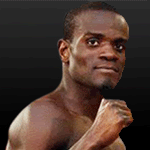Call me a boxing Philistine after this if you want.
To be fair, you might not be too far off the mark. But there’s been something bugging me for a while now, so I thought I might as well burn someone else’s ears with it.
Enter, the Bleacher Report boxing community.
Over the past year in particular, because of the dominance of a certain Filipino whirlwind, the issue of size and weight in boxing has been much talked about. In Manny Pacquiao’s last three bouts, he has fought fighters that were all ‘"naturally" bigger men.
This fact was stressed by internet bloggers and expert commentators alike, and was put forward as the main reason why the “Pacman” would not be victorious in the fights.
Certainly, in his fight against Oscar De La Hoya it was assumed by many that the Mexican would be too big and strong for him. Because he was "naturally" bigger. But we all know what happened then, and subsequently against Hatton and Cotto.
So that begs the question, for me, at least, whether a "natural" weight advantage is over-emphasized, and whether more focus should be placed on boxing skills.
During Manny’s fight against Ricky Hatton, one of the Sky Sports commentators spoke of how Ricky Hatton was the naturally bigger man. Now, of this there is no doubt.
The Englishman explodes between fights, putting on three or four stone of weight. So yes, if the two men met on the street (although given that it’s Hatton it may more likely be in a bar) in-between fights, Ricky would be the naturally bigger guy.
But come fight-time, that size advantage has been diminished. Hatton is no longer at his natural weight. It may be his ordinary fighting weight, but it would seem anything but natural.
The same can be said about Miguel Cotto, though, not to the same extreme. The Puerto Rican’s effort to make the 145-pound weight limit could well have taken a toll on his body. At the weigh-in, he only had a one-pound advantage over Manny.
However, in my opinion, Pacquiao looked the stronger of the two, with his chest and shoulders looking more defined. Granted, on the night of the fight Cotto probably weighed closer to 160 pounds, but I think this weight advantage is over-estimated by a lot of people.
When it comes down to it, six or seven pounds, is really a rather negligible amount. In terms of boxing it is regarded as a weight class, but in reality it is not substantial. Of course, out of this comes the debate of the weight divisions in boxing. I’m guessing the main reason for so many is that it creates more revenue for boxing authorities, but I would doubt whether there really is a marked difference between 140 pounds and 147 pounds.
I don’t think weight necessarily corresponds with power, either. Although I am no expert on the fight game, I think a lot of it comes from the lower body, core, and shoulders, and not specifically from weight alone. I’m sure technique and speed also play an important part.
And I think Pacquiao was stronger than all of his last three opponents, despite conceding the relatively slight weight advantage. Couple that with the fact that he is a better boxer than those three opponents, and it is easy to see why he won.
Indeed, a quick look through the comments about the Clottey/Pacquiao fight indicates to me that the size issue is, and will be, stressed again. But once again, I feel this argument is without any great merit. Clottey may be naturally bigger, but I definitely don’t think this corresponds to a proportionate power advantage. Because of this, I just don’t see how an argument can be put forward in favour of the African for this fight.
Manny Pacquiao will be naturally smaller than the majority of welterweights, but he is also a better boxer than the majority, as well. I think this far "outweighs" the importance of a slight size deficit.
Though he may give away a 10-pound weight advantage, I know exactly who my money would be on.
Except against Floyd. Naturally.
ZING!
Hey, I had to try and create even the smallest bit of controversy in this article.
Source: bleacherreport.com
To be fair, you might not be too far off the mark. But there’s been something bugging me for a while now, so I thought I might as well burn someone else’s ears with it.
Enter, the Bleacher Report boxing community.
Over the past year in particular, because of the dominance of a certain Filipino whirlwind, the issue of size and weight in boxing has been much talked about. In Manny Pacquiao’s last three bouts, he has fought fighters that were all ‘"naturally" bigger men.
This fact was stressed by internet bloggers and expert commentators alike, and was put forward as the main reason why the “Pacman” would not be victorious in the fights.
Certainly, in his fight against Oscar De La Hoya it was assumed by many that the Mexican would be too big and strong for him. Because he was "naturally" bigger. But we all know what happened then, and subsequently against Hatton and Cotto.
So that begs the question, for me, at least, whether a "natural" weight advantage is over-emphasized, and whether more focus should be placed on boxing skills.
During Manny’s fight against Ricky Hatton, one of the Sky Sports commentators spoke of how Ricky Hatton was the naturally bigger man. Now, of this there is no doubt.
The Englishman explodes between fights, putting on three or four stone of weight. So yes, if the two men met on the street (although given that it’s Hatton it may more likely be in a bar) in-between fights, Ricky would be the naturally bigger guy.
But come fight-time, that size advantage has been diminished. Hatton is no longer at his natural weight. It may be his ordinary fighting weight, but it would seem anything but natural.
The same can be said about Miguel Cotto, though, not to the same extreme. The Puerto Rican’s effort to make the 145-pound weight limit could well have taken a toll on his body. At the weigh-in, he only had a one-pound advantage over Manny.
However, in my opinion, Pacquiao looked the stronger of the two, with his chest and shoulders looking more defined. Granted, on the night of the fight Cotto probably weighed closer to 160 pounds, but I think this weight advantage is over-estimated by a lot of people.
When it comes down to it, six or seven pounds, is really a rather negligible amount. In terms of boxing it is regarded as a weight class, but in reality it is not substantial. Of course, out of this comes the debate of the weight divisions in boxing. I’m guessing the main reason for so many is that it creates more revenue for boxing authorities, but I would doubt whether there really is a marked difference between 140 pounds and 147 pounds.
I don’t think weight necessarily corresponds with power, either. Although I am no expert on the fight game, I think a lot of it comes from the lower body, core, and shoulders, and not specifically from weight alone. I’m sure technique and speed also play an important part.
And I think Pacquiao was stronger than all of his last three opponents, despite conceding the relatively slight weight advantage. Couple that with the fact that he is a better boxer than those three opponents, and it is easy to see why he won.
Indeed, a quick look through the comments about the Clottey/Pacquiao fight indicates to me that the size issue is, and will be, stressed again. But once again, I feel this argument is without any great merit. Clottey may be naturally bigger, but I definitely don’t think this corresponds to a proportionate power advantage. Because of this, I just don’t see how an argument can be put forward in favour of the African for this fight.
Manny Pacquiao will be naturally smaller than the majority of welterweights, but he is also a better boxer than the majority, as well. I think this far "outweighs" the importance of a slight size deficit.
Though he may give away a 10-pound weight advantage, I know exactly who my money would be on.
Except against Floyd. Naturally.
ZING!
Hey, I had to try and create even the smallest bit of controversy in this article.
Source: bleacherreport.com



No comments:
Post a Comment